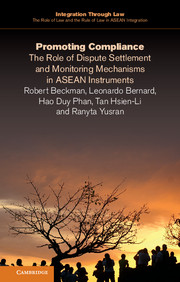Book contents
- Frontmatter
- Contents
- List of figures
- General editors’ preface
- List of abbreviations
- Introduction: overview and research rationale
- 1 The normative and theoretical underpinnings of ASEAN compliance behaviour
- 2 Dispute settlement mechanisms in ASEAN
- 3 Compliance monitoring mechanisms in ASEAN
- 4 Recommendations
- Executive summary
- Appendix 1 CIL’s observation on dispute settlement clauses in selected ASEAN agreements adopted prior to the ASEAN Charter
- Appendix 2 List of ASEAN instruments' provisions related to treaty compliance
- Bibliography
- Index
Introduction: overview and research rationale
Published online by Cambridge University Press: 05 March 2016
- Frontmatter
- Contents
- List of figures
- General editors’ preface
- List of abbreviations
- Introduction: overview and research rationale
- 1 The normative and theoretical underpinnings of ASEAN compliance behaviour
- 2 Dispute settlement mechanisms in ASEAN
- 3 Compliance monitoring mechanisms in ASEAN
- 4 Recommendations
- Executive summary
- Appendix 1 CIL’s observation on dispute settlement clauses in selected ASEAN agreements adopted prior to the ASEAN Charter
- Appendix 2 List of ASEAN instruments' provisions related to treaty compliance
- Bibliography
- Index
Summary
This is a special year for ASEAN. On August 8, 2007, ASEAN celebrated its 40th anniversary. In November, the ASEAN Summit will be held in Singapore. One of the key deliverables of the Summit is the adoption by the 10 ASEAN Leaders of the ASEAN Charter. It has the potential to transform ASEAN into a stronger, more united and effective organisation … [I]t will grow a culture of taking our obligations seriously. In the past, only about 30 percent of ASEAN's agreements were implemented. We will put in place a system of compliance monitoring and, most importantly, a system of compulsory dispute-settlement for non-compliance that will apply to all ASEAN agreements.
Tommy Koh, Walter Woon, Andrew Tan and Chan Sze Wei Singapore Team for the drafting of the ASEAN CharterThe adoption of the ASEAN Charter on 20 November 2007 was a momentous turning point in the 40-year history of the organisation. Through this treaty, ASEAN member states inaugurated the maturation of their grouping into a formal international organisation with legal personality, codified regional norms and set in place a firm legal and institutional framework to bring about the ASEAN Community. Achieving this lofty ambition for the rule of law and institutions to reign meant that regional commitments required better adherence. To that end, the ASEAN Charter stipulated compliance monitoring and dispute settlement mechanisms to enhance implementation levels of ASEAN instruments. These changes, enunciated in the ASEAN Charter, were the culmination of ASEAN's gradual evolution, catalysed into being by the Eminent Persons Group (EPG) tasked with advising on ASEAN's new trajectory and drafted into existence by the High Level Task Force (HLTF). In particular, the EPG pushed for the institutionalisation of ‘effective monitoring, compliance and dispute settlement mechanisms’. It is significant that adherence to the rule of law and institutions is deemed so crucial to ASEAN's transformation that while the HLTF did not incorporate all the EPG recommendations, those pertaining to compliance monitoring and dispute settlement were.
As the organisation's reputation and achievement of the ASEAN Community hinges on member states’ adherence to commitments, the rationale behind this book is to test whether ASEAN's faith in dispute settlement and monitoring mechanisms as a means to better compliance is justified and the extent to which they can facilitate this process.
- Type
- Chapter
- Information
- Promoting ComplianceThe Role of Dispute Settlement and Monitoring Mechanisms in ASEAN Instruments, pp. 1 - 11Publisher: Cambridge University PressPrint publication year: 2016

